Module Research Proposal: Social Media Marketing and Brand Awareness
VerifiedAdded on 2022/08/01
|7
|2247
|32
Homework Assignment
AI Summary
This assignment presents a preliminary research proposal exploring the correlation between social media marketing strategies and the development of brand awareness within target markets. The proposal begins by highlighting the increasing importance of social media marketing in today's digital landscape, emphasizing its role in brand awareness, sales growth, and website traffic. It then outlines the aims and objectives of the research, which is to inform companies about the significance of effective social media marketing strategies and their impact on brand awareness, while also exploring the measurement of ROI. The research question focuses on the optimal social media marketing strategies for achieving brand awareness. The methodology section describes the use of primary and secondary research, including the application of social network theory and Buckner's theory on rumour transmission, to investigate the relationship between SMM and brand awareness. The expected contribution is to provide practical guidance for companies in structuring their social media marketing efforts, leading to increased brand awareness and improved marketing ROI. References to relevant literature support the research's theoretical framework and practical application.
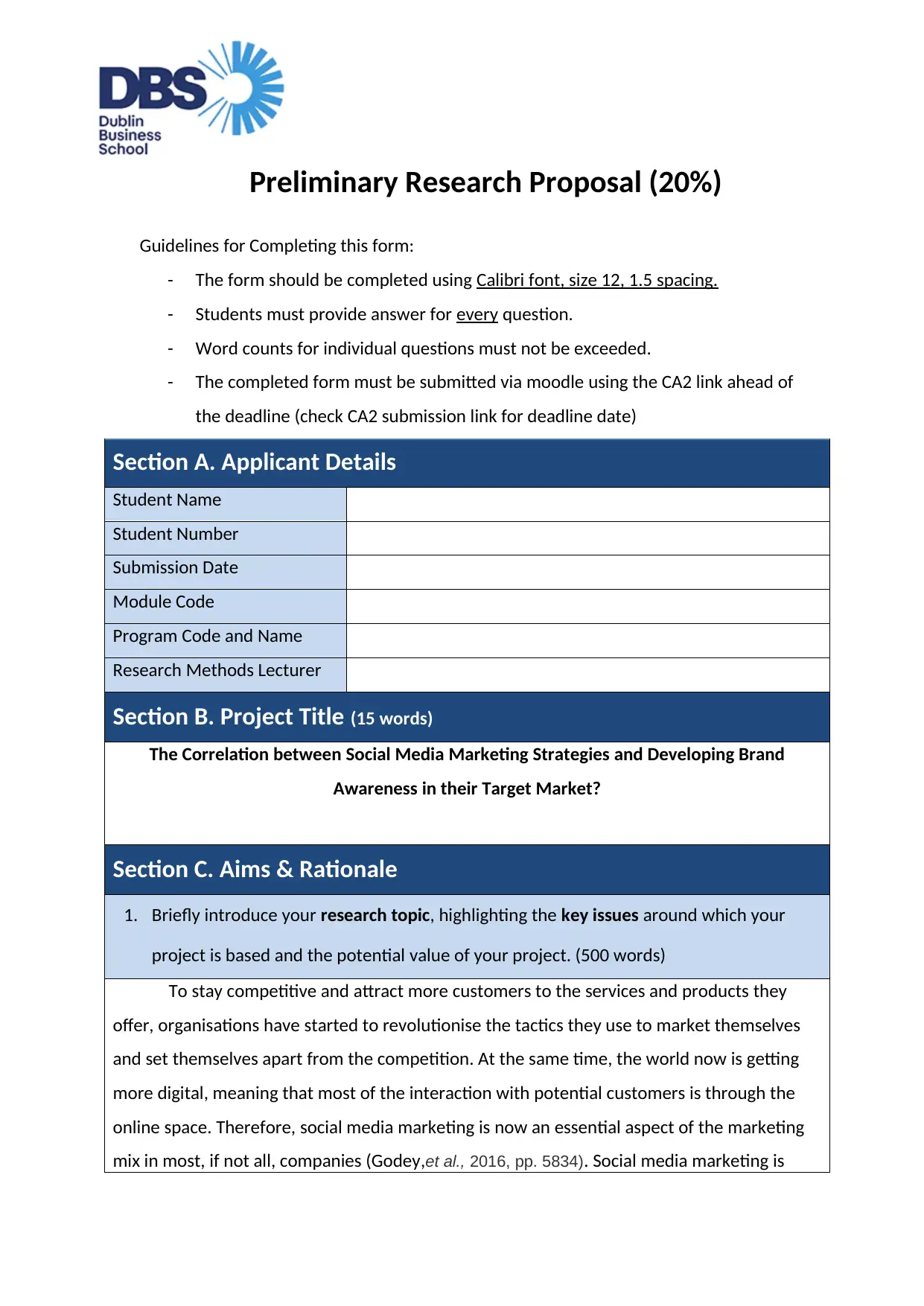
Preliminary Research Proposal (20%)
Guidelines for Completing this form:
- The form should be completed using Calibri font, size 12, 1.5 spacing.
- Students must provide answer for every question.
- Word counts for individual questions must not be exceeded.
- The completed form must be submitted via moodle using the CA2 link ahead of
the deadline (check CA2 submission link for deadline date)
Section A. Applicant Details
Student Name
Student Number
Submission Date
Module Code
Program Code and Name
Research Methods Lecturer
Section B. Project Title (15 words)
The Correlation between Social Media Marketing Strategies and Developing Brand
Awareness in their Target Market?
Section C. Aims & Rationale
1. Briefly introduce your research topic, highlighting the key issues around which your
project is based and the potential value of your project. (500 words)
To stay competitive and attract more customers to the services and products they
offer, organisations have started to revolutionise the tactics they use to market themselves
and set themselves apart from the competition. At the same time, the world now is getting
more digital, meaning that most of the interaction with potential customers is through the
online space. Therefore, social media marketing is now an essential aspect of the marketing
mix in most, if not all, companies (Godey,et al., 2016, pp. 5834). Social media marketing is
Guidelines for Completing this form:
- The form should be completed using Calibri font, size 12, 1.5 spacing.
- Students must provide answer for every question.
- Word counts for individual questions must not be exceeded.
- The completed form must be submitted via moodle using the CA2 link ahead of
the deadline (check CA2 submission link for deadline date)
Section A. Applicant Details
Student Name
Student Number
Submission Date
Module Code
Program Code and Name
Research Methods Lecturer
Section B. Project Title (15 words)
The Correlation between Social Media Marketing Strategies and Developing Brand
Awareness in their Target Market?
Section C. Aims & Rationale
1. Briefly introduce your research topic, highlighting the key issues around which your
project is based and the potential value of your project. (500 words)
To stay competitive and attract more customers to the services and products they
offer, organisations have started to revolutionise the tactics they use to market themselves
and set themselves apart from the competition. At the same time, the world now is getting
more digital, meaning that most of the interaction with potential customers is through the
online space. Therefore, social media marketing is now an essential aspect of the marketing
mix in most, if not all, companies (Godey,et al., 2016, pp. 5834). Social media marketing is
Paraphrase This Document
Need a fresh take? Get an instant paraphrase of this document with our AI Paraphraser
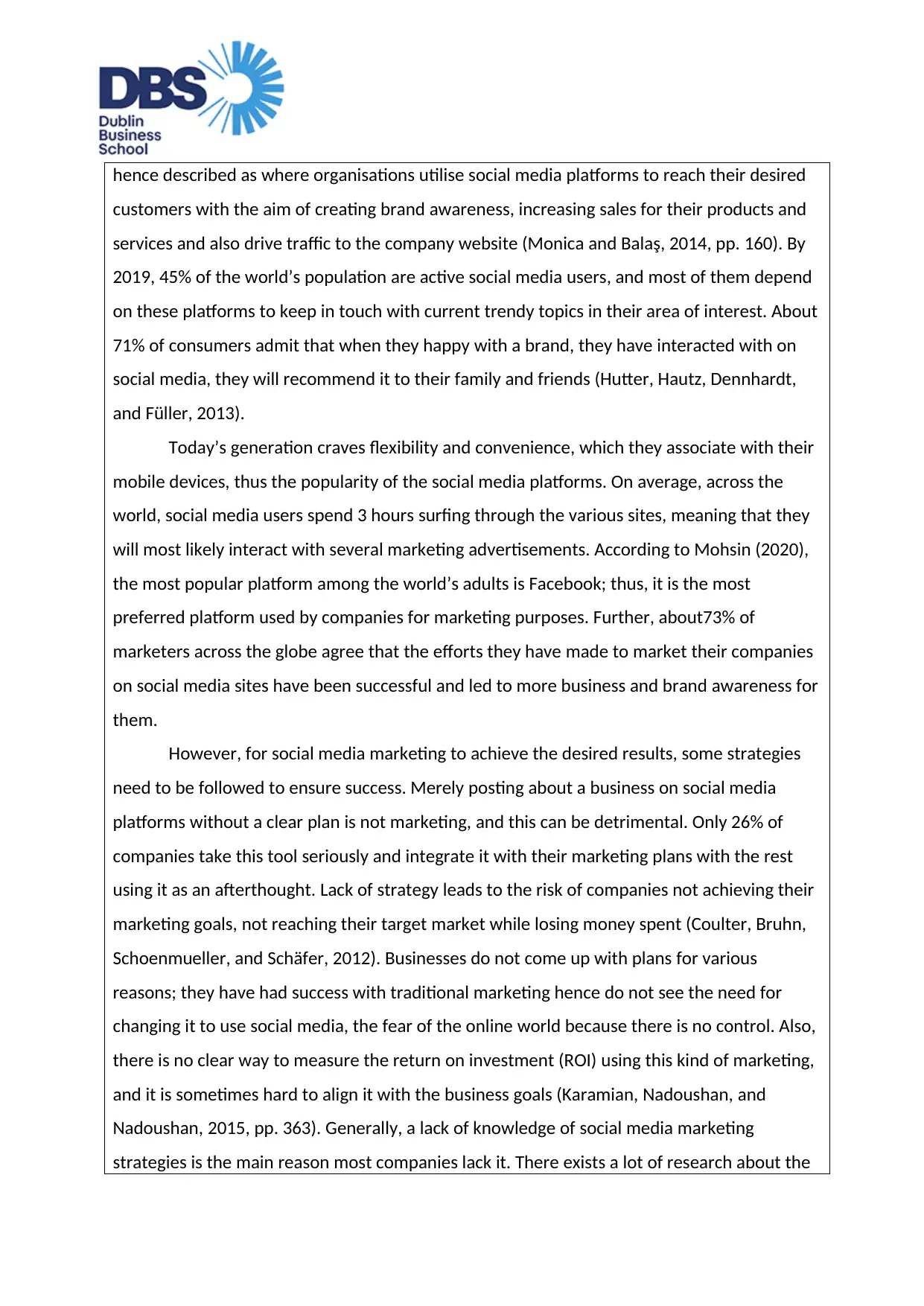
hence described as where organisations utilise social media platforms to reach their desired
customers with the aim of creating brand awareness, increasing sales for their products and
services and also drive traffic to the company website (Monica and Balaş, 2014, pp. 160). By
2019, 45% of the world’s population are active social media users, and most of them depend
on these platforms to keep in touch with current trendy topics in their area of interest. About
71% of consumers admit that when they happy with a brand, they have interacted with on
social media, they will recommend it to their family and friends (Hutter, Hautz, Dennhardt,
and Füller, 2013).
Today’s generation craves flexibility and convenience, which they associate with their
mobile devices, thus the popularity of the social media platforms. On average, across the
world, social media users spend 3 hours surfing through the various sites, meaning that they
will most likely interact with several marketing advertisements. According to Mohsin (2020),
the most popular platform among the world’s adults is Facebook; thus, it is the most
preferred platform used by companies for marketing purposes. Further, about73% of
marketers across the globe agree that the efforts they have made to market their companies
on social media sites have been successful and led to more business and brand awareness for
them.
However, for social media marketing to achieve the desired results, some strategies
need to be followed to ensure success. Merely posting about a business on social media
platforms without a clear plan is not marketing, and this can be detrimental. Only 26% of
companies take this tool seriously and integrate it with their marketing plans with the rest
using it as an afterthought. Lack of strategy leads to the risk of companies not achieving their
marketing goals, not reaching their target market while losing money spent (Coulter, Bruhn,
Schoenmueller, and Schäfer, 2012). Businesses do not come up with plans for various
reasons; they have had success with traditional marketing hence do not see the need for
changing it to use social media, the fear of the online world because there is no control. Also,
there is no clear way to measure the return on investment (ROI) using this kind of marketing,
and it is sometimes hard to align it with the business goals (Karamian, Nadoushan, and
Nadoushan, 2015, pp. 363). Generally, a lack of knowledge of social media marketing
strategies is the main reason most companies lack it. There exists a lot of research about the
customers with the aim of creating brand awareness, increasing sales for their products and
services and also drive traffic to the company website (Monica and Balaş, 2014, pp. 160). By
2019, 45% of the world’s population are active social media users, and most of them depend
on these platforms to keep in touch with current trendy topics in their area of interest. About
71% of consumers admit that when they happy with a brand, they have interacted with on
social media, they will recommend it to their family and friends (Hutter, Hautz, Dennhardt,
and Füller, 2013).
Today’s generation craves flexibility and convenience, which they associate with their
mobile devices, thus the popularity of the social media platforms. On average, across the
world, social media users spend 3 hours surfing through the various sites, meaning that they
will most likely interact with several marketing advertisements. According to Mohsin (2020),
the most popular platform among the world’s adults is Facebook; thus, it is the most
preferred platform used by companies for marketing purposes. Further, about73% of
marketers across the globe agree that the efforts they have made to market their companies
on social media sites have been successful and led to more business and brand awareness for
them.
However, for social media marketing to achieve the desired results, some strategies
need to be followed to ensure success. Merely posting about a business on social media
platforms without a clear plan is not marketing, and this can be detrimental. Only 26% of
companies take this tool seriously and integrate it with their marketing plans with the rest
using it as an afterthought. Lack of strategy leads to the risk of companies not achieving their
marketing goals, not reaching their target market while losing money spent (Coulter, Bruhn,
Schoenmueller, and Schäfer, 2012). Businesses do not come up with plans for various
reasons; they have had success with traditional marketing hence do not see the need for
changing it to use social media, the fear of the online world because there is no control. Also,
there is no clear way to measure the return on investment (ROI) using this kind of marketing,
and it is sometimes hard to align it with the business goals (Karamian, Nadoushan, and
Nadoushan, 2015, pp. 363). Generally, a lack of knowledge of social media marketing
strategies is the main reason most companies lack it. There exists a lot of research about the
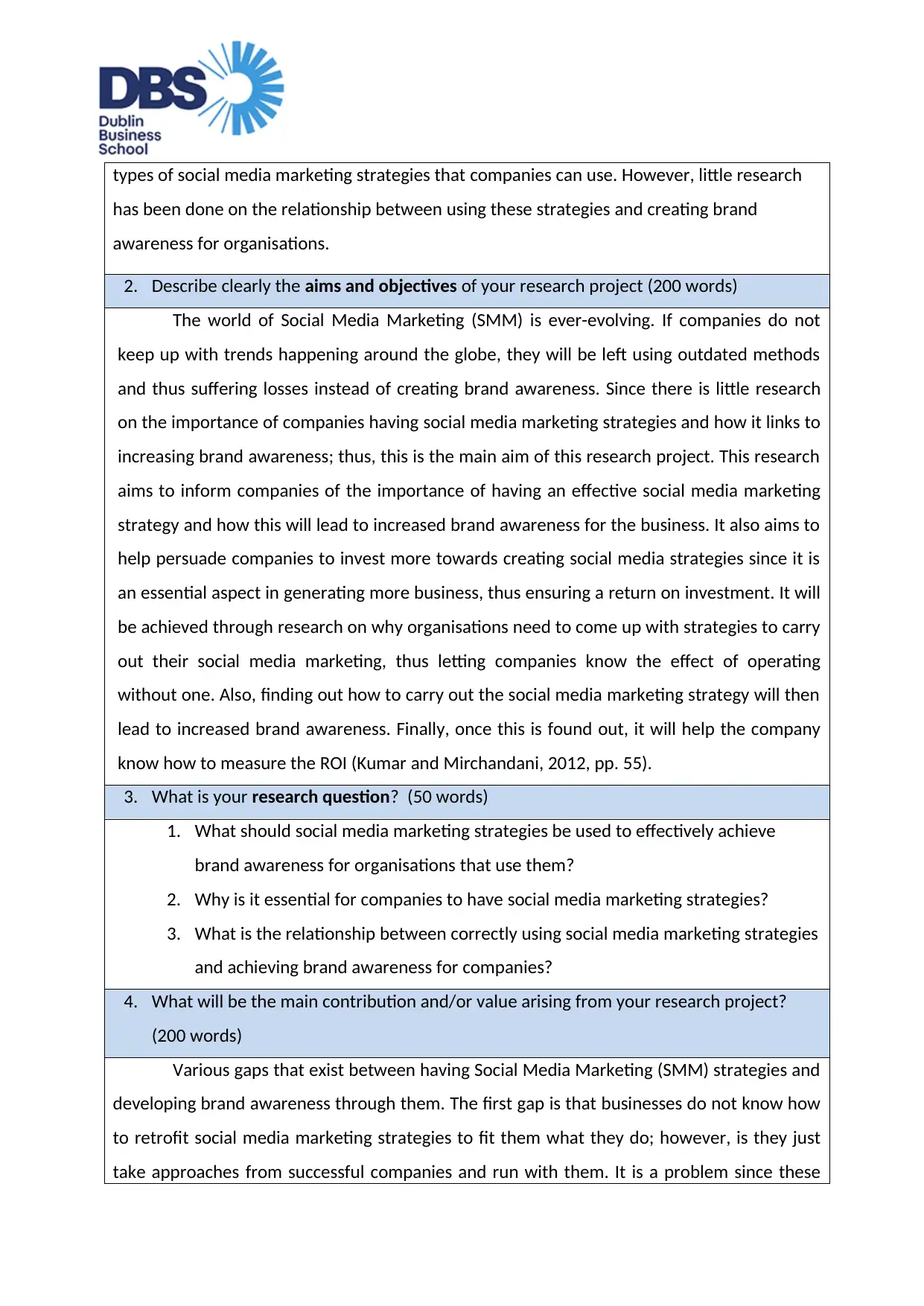
types of social media marketing strategies that companies can use. However, little research
has been done on the relationship between using these strategies and creating brand
awareness for organisations.
2. Describe clearly the aims and objectives of your research project (200 words)
The world of Social Media Marketing (SMM) is ever-evolving. If companies do not
keep up with trends happening around the globe, they will be left using outdated methods
and thus suffering losses instead of creating brand awareness. Since there is little research
on the importance of companies having social media marketing strategies and how it links to
increasing brand awareness; thus, this is the main aim of this research project. This research
aims to inform companies of the importance of having an effective social media marketing
strategy and how this will lead to increased brand awareness for the business. It also aims to
help persuade companies to invest more towards creating social media strategies since it is
an essential aspect in generating more business, thus ensuring a return on investment. It will
be achieved through research on why organisations need to come up with strategies to carry
out their social media marketing, thus letting companies know the effect of operating
without one. Also, finding out how to carry out the social media marketing strategy will then
lead to increased brand awareness. Finally, once this is found out, it will help the company
know how to measure the ROI (Kumar and Mirchandani, 2012, pp. 55).
3. What is your research question? (50 words)
1. What should social media marketing strategies be used to effectively achieve
brand awareness for organisations that use them?
2. Why is it essential for companies to have social media marketing strategies?
3. What is the relationship between correctly using social media marketing strategies
and achieving brand awareness for companies?
4. What will be the main contribution and/or value arising from your research project?
(200 words)
Various gaps that exist between having Social Media Marketing (SMM) strategies and
developing brand awareness through them. The first gap is that businesses do not know how
to retrofit social media marketing strategies to fit them what they do; however, is they just
take approaches from successful companies and run with them. It is a problem since these
has been done on the relationship between using these strategies and creating brand
awareness for organisations.
2. Describe clearly the aims and objectives of your research project (200 words)
The world of Social Media Marketing (SMM) is ever-evolving. If companies do not
keep up with trends happening around the globe, they will be left using outdated methods
and thus suffering losses instead of creating brand awareness. Since there is little research
on the importance of companies having social media marketing strategies and how it links to
increasing brand awareness; thus, this is the main aim of this research project. This research
aims to inform companies of the importance of having an effective social media marketing
strategy and how this will lead to increased brand awareness for the business. It also aims to
help persuade companies to invest more towards creating social media strategies since it is
an essential aspect in generating more business, thus ensuring a return on investment. It will
be achieved through research on why organisations need to come up with strategies to carry
out their social media marketing, thus letting companies know the effect of operating
without one. Also, finding out how to carry out the social media marketing strategy will then
lead to increased brand awareness. Finally, once this is found out, it will help the company
know how to measure the ROI (Kumar and Mirchandani, 2012, pp. 55).
3. What is your research question? (50 words)
1. What should social media marketing strategies be used to effectively achieve
brand awareness for organisations that use them?
2. Why is it essential for companies to have social media marketing strategies?
3. What is the relationship between correctly using social media marketing strategies
and achieving brand awareness for companies?
4. What will be the main contribution and/or value arising from your research project?
(200 words)
Various gaps that exist between having Social Media Marketing (SMM) strategies and
developing brand awareness through them. The first gap is that businesses do not know how
to retrofit social media marketing strategies to fit them what they do; however, is they just
take approaches from successful companies and run with them. It is a problem since these
⊘ This is a preview!⊘
Do you want full access?
Subscribe today to unlock all pages.

Trusted by 1+ million students worldwide
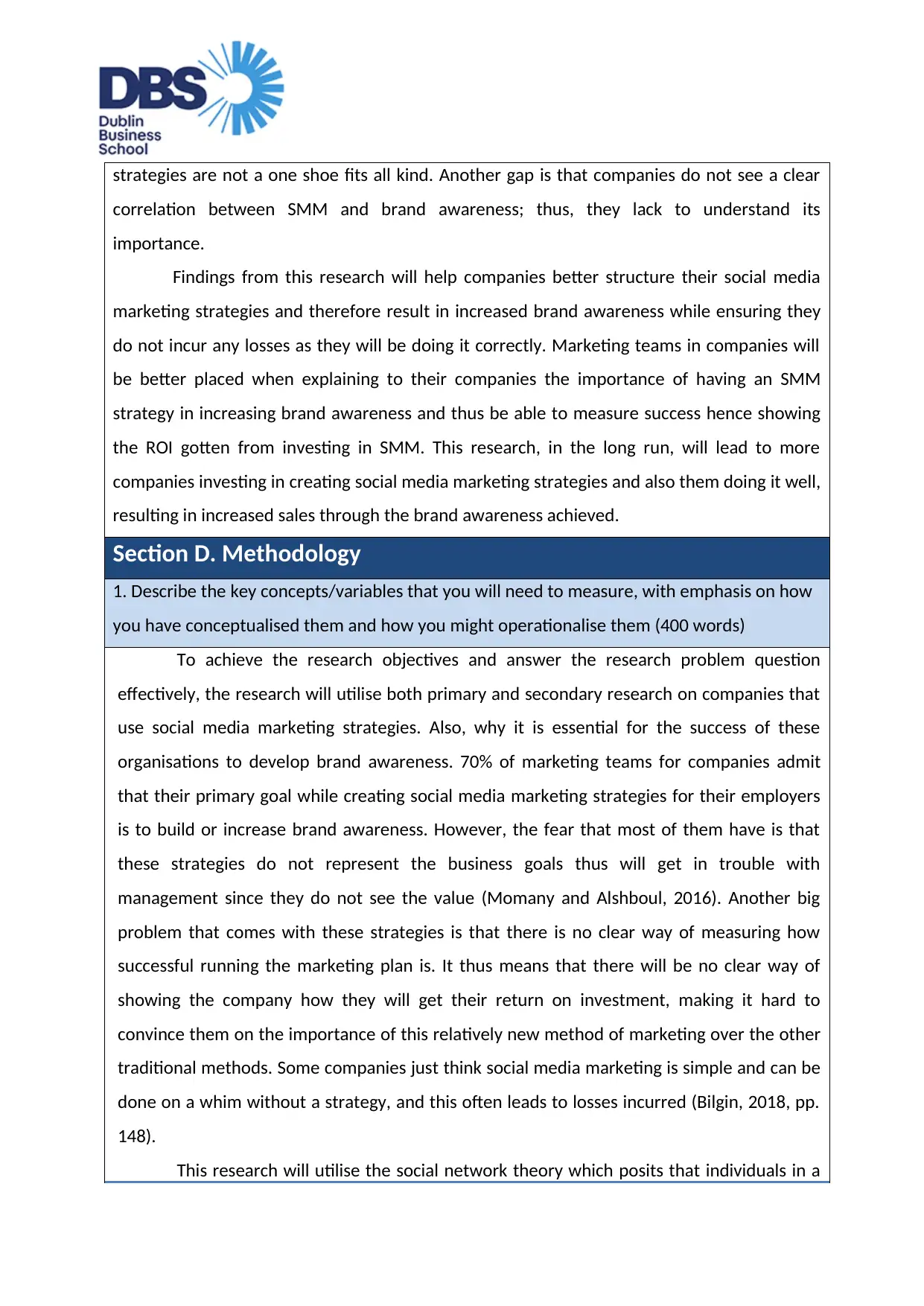
strategies are not a one shoe fits all kind. Another gap is that companies do not see a clear
correlation between SMM and brand awareness; thus, they lack to understand its
importance.
Findings from this research will help companies better structure their social media
marketing strategies and therefore result in increased brand awareness while ensuring they
do not incur any losses as they will be doing it correctly. Marketing teams in companies will
be better placed when explaining to their companies the importance of having an SMM
strategy in increasing brand awareness and thus be able to measure success hence showing
the ROI gotten from investing in SMM. This research, in the long run, will lead to more
companies investing in creating social media marketing strategies and also them doing it well,
resulting in increased sales through the brand awareness achieved.
Section D. Methodology
1. Describe the key concepts/variables that you will need to measure, with emphasis on how
you have conceptualised them and how you might operationalise them (400 words)
To achieve the research objectives and answer the research problem question
effectively, the research will utilise both primary and secondary research on companies that
use social media marketing strategies. Also, why it is essential for the success of these
organisations to develop brand awareness. 70% of marketing teams for companies admit
that their primary goal while creating social media marketing strategies for their employers
is to build or increase brand awareness. However, the fear that most of them have is that
these strategies do not represent the business goals thus will get in trouble with
management since they do not see the value (Momany and Alshboul, 2016). Another big
problem that comes with these strategies is that there is no clear way of measuring how
successful running the marketing plan is. It thus means that there will be no clear way of
showing the company how they will get their return on investment, making it hard to
convince them on the importance of this relatively new method of marketing over the other
traditional methods. Some companies just think social media marketing is simple and can be
done on a whim without a strategy, and this often leads to losses incurred (Bilgin, 2018, pp.
148).
This research will utilise the social network theory which posits that individuals in a
correlation between SMM and brand awareness; thus, they lack to understand its
importance.
Findings from this research will help companies better structure their social media
marketing strategies and therefore result in increased brand awareness while ensuring they
do not incur any losses as they will be doing it correctly. Marketing teams in companies will
be better placed when explaining to their companies the importance of having an SMM
strategy in increasing brand awareness and thus be able to measure success hence showing
the ROI gotten from investing in SMM. This research, in the long run, will lead to more
companies investing in creating social media marketing strategies and also them doing it well,
resulting in increased sales through the brand awareness achieved.
Section D. Methodology
1. Describe the key concepts/variables that you will need to measure, with emphasis on how
you have conceptualised them and how you might operationalise them (400 words)
To achieve the research objectives and answer the research problem question
effectively, the research will utilise both primary and secondary research on companies that
use social media marketing strategies. Also, why it is essential for the success of these
organisations to develop brand awareness. 70% of marketing teams for companies admit
that their primary goal while creating social media marketing strategies for their employers
is to build or increase brand awareness. However, the fear that most of them have is that
these strategies do not represent the business goals thus will get in trouble with
management since they do not see the value (Momany and Alshboul, 2016). Another big
problem that comes with these strategies is that there is no clear way of measuring how
successful running the marketing plan is. It thus means that there will be no clear way of
showing the company how they will get their return on investment, making it hard to
convince them on the importance of this relatively new method of marketing over the other
traditional methods. Some companies just think social media marketing is simple and can be
done on a whim without a strategy, and this often leads to losses incurred (Bilgin, 2018, pp.
148).
This research will utilise the social network theory which posits that individuals in a
Paraphrase This Document
Need a fresh take? Get an instant paraphrase of this document with our AI Paraphraser
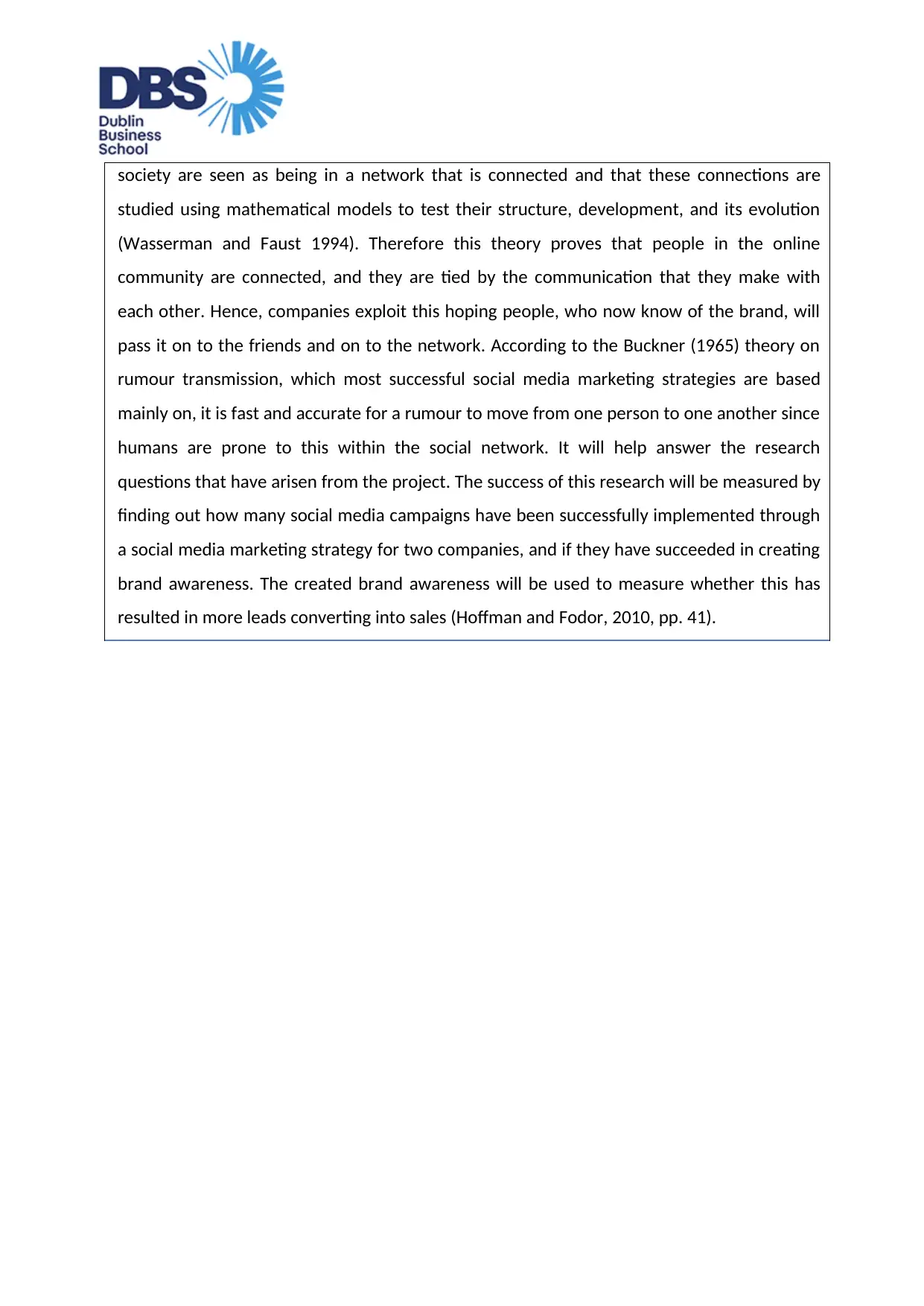
society are seen as being in a network that is connected and that these connections are
studied using mathematical models to test their structure, development, and its evolution
(Wasserman and Faust 1994). Therefore this theory proves that people in the online
community are connected, and they are tied by the communication that they make with
each other. Hence, companies exploit this hoping people, who now know of the brand, will
pass it on to the friends and on to the network. According to the Buckner (1965) theory on
rumour transmission, which most successful social media marketing strategies are based
mainly on, it is fast and accurate for a rumour to move from one person to one another since
humans are prone to this within the social network. It will help answer the research
questions that have arisen from the project. The success of this research will be measured by
finding out how many social media campaigns have been successfully implemented through
a social media marketing strategy for two companies, and if they have succeeded in creating
brand awareness. The created brand awareness will be used to measure whether this has
resulted in more leads converting into sales (Hoffman and Fodor, 2010, pp. 41).
studied using mathematical models to test their structure, development, and its evolution
(Wasserman and Faust 1994). Therefore this theory proves that people in the online
community are connected, and they are tied by the communication that they make with
each other. Hence, companies exploit this hoping people, who now know of the brand, will
pass it on to the friends and on to the network. According to the Buckner (1965) theory on
rumour transmission, which most successful social media marketing strategies are based
mainly on, it is fast and accurate for a rumour to move from one person to one another since
humans are prone to this within the social network. It will help answer the research
questions that have arisen from the project. The success of this research will be measured by
finding out how many social media campaigns have been successfully implemented through
a social media marketing strategy for two companies, and if they have succeeded in creating
brand awareness. The created brand awareness will be used to measure whether this has
resulted in more leads converting into sales (Hoffman and Fodor, 2010, pp. 41).
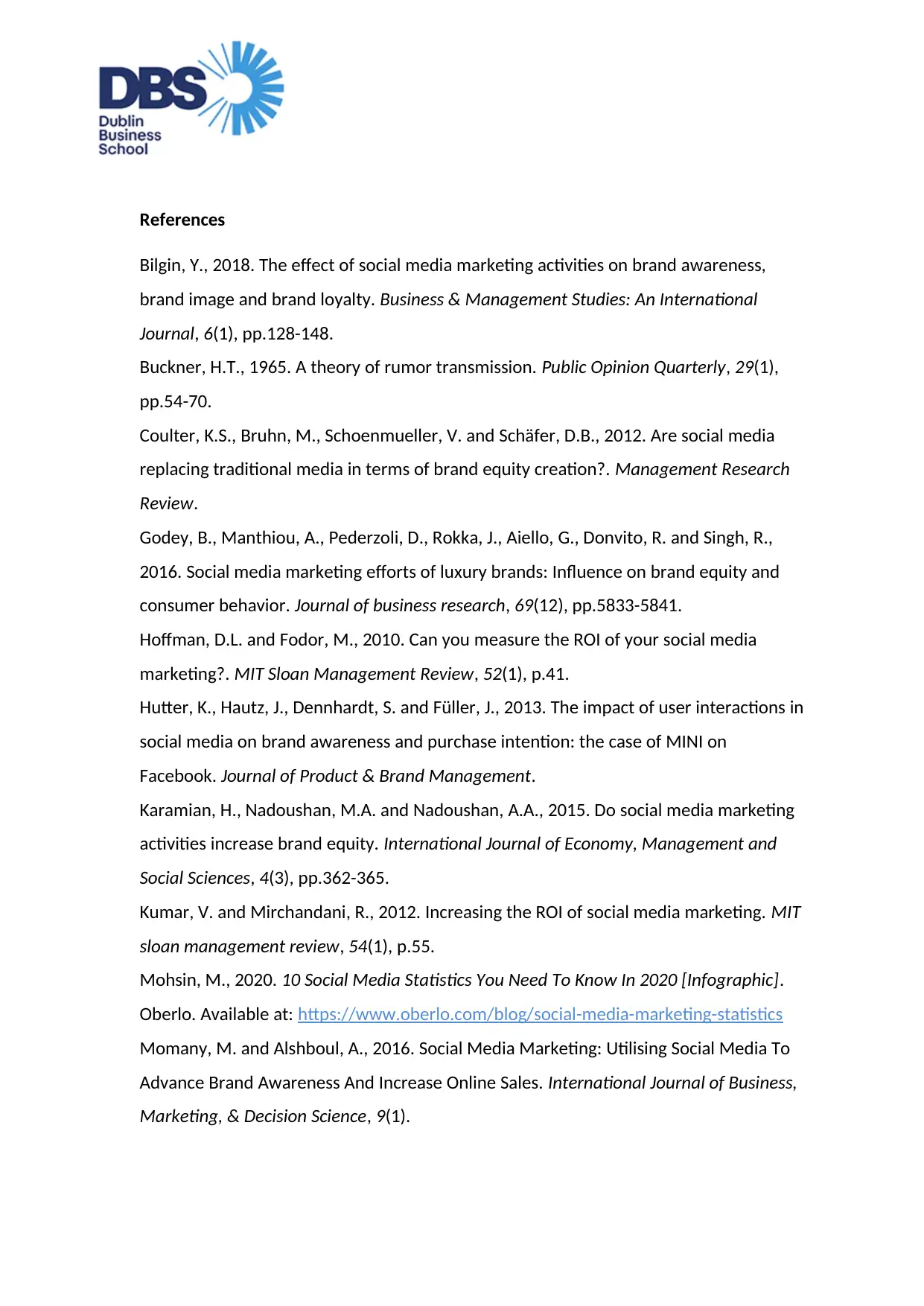
References
Bilgin, Y., 2018. The effect of social media marketing activities on brand awareness,
brand image and brand loyalty. Business & Management Studies: An International
Journal, 6(1), pp.128-148.
Buckner, H.T., 1965. A theory of rumor transmission. Public Opinion Quarterly, 29(1),
pp.54-70.
Coulter, K.S., Bruhn, M., Schoenmueller, V. and Schäfer, D.B., 2012. Are social media
replacing traditional media in terms of brand equity creation?. Management Research
Review.
Godey, B., Manthiou, A., Pederzoli, D., Rokka, J., Aiello, G., Donvito, R. and Singh, R.,
2016. Social media marketing efforts of luxury brands: Influence on brand equity and
consumer behavior. Journal of business research, 69(12), pp.5833-5841.
Hoffman, D.L. and Fodor, M., 2010. Can you measure the ROI of your social media
marketing?. MIT Sloan Management Review, 52(1), p.41.
Hutter, K., Hautz, J., Dennhardt, S. and Füller, J., 2013. The impact of user interactions in
social media on brand awareness and purchase intention: the case of MINI on
Facebook. Journal of Product & Brand Management.
Karamian, H., Nadoushan, M.A. and Nadoushan, A.A., 2015. Do social media marketing
activities increase brand equity. International Journal of Economy, Management and
Social Sciences, 4(3), pp.362-365.
Kumar, V. and Mirchandani, R., 2012. Increasing the ROI of social media marketing. MIT
sloan management review, 54(1), p.55.
Mohsin, M., 2020. 10 Social Media Statistics You Need To Know In 2020 [Infographic].
Oberlo. Available at: https://www.oberlo.com/blog/social-media-marketing-statistics
Momany, M. and Alshboul, A., 2016. Social Media Marketing: Utilising Social Media To
Advance Brand Awareness And Increase Online Sales. International Journal of Business,
Marketing, & Decision Science, 9(1).
Bilgin, Y., 2018. The effect of social media marketing activities on brand awareness,
brand image and brand loyalty. Business & Management Studies: An International
Journal, 6(1), pp.128-148.
Buckner, H.T., 1965. A theory of rumor transmission. Public Opinion Quarterly, 29(1),
pp.54-70.
Coulter, K.S., Bruhn, M., Schoenmueller, V. and Schäfer, D.B., 2012. Are social media
replacing traditional media in terms of brand equity creation?. Management Research
Review.
Godey, B., Manthiou, A., Pederzoli, D., Rokka, J., Aiello, G., Donvito, R. and Singh, R.,
2016. Social media marketing efforts of luxury brands: Influence on brand equity and
consumer behavior. Journal of business research, 69(12), pp.5833-5841.
Hoffman, D.L. and Fodor, M., 2010. Can you measure the ROI of your social media
marketing?. MIT Sloan Management Review, 52(1), p.41.
Hutter, K., Hautz, J., Dennhardt, S. and Füller, J., 2013. The impact of user interactions in
social media on brand awareness and purchase intention: the case of MINI on
Facebook. Journal of Product & Brand Management.
Karamian, H., Nadoushan, M.A. and Nadoushan, A.A., 2015. Do social media marketing
activities increase brand equity. International Journal of Economy, Management and
Social Sciences, 4(3), pp.362-365.
Kumar, V. and Mirchandani, R., 2012. Increasing the ROI of social media marketing. MIT
sloan management review, 54(1), p.55.
Mohsin, M., 2020. 10 Social Media Statistics You Need To Know In 2020 [Infographic].
Oberlo. Available at: https://www.oberlo.com/blog/social-media-marketing-statistics
Momany, M. and Alshboul, A., 2016. Social Media Marketing: Utilising Social Media To
Advance Brand Awareness And Increase Online Sales. International Journal of Business,
Marketing, & Decision Science, 9(1).
⊘ This is a preview!⊘
Do you want full access?
Subscribe today to unlock all pages.

Trusted by 1+ million students worldwide

Monica, B. and Balaş, R., 2014. Social media marketing to increase brand
awareness. Journal of Economics and Business Research, 20(2), pp.155-164.
Wasserman, S. and Faust, K., 1994. Social network analysis: Methods and
applications (Vol. 8). Cambridge university press.
awareness. Journal of Economics and Business Research, 20(2), pp.155-164.
Wasserman, S. and Faust, K., 1994. Social network analysis: Methods and
applications (Vol. 8). Cambridge university press.
1 out of 7
Related Documents
Your All-in-One AI-Powered Toolkit for Academic Success.
+13062052269
info@desklib.com
Available 24*7 on WhatsApp / Email
![[object Object]](/_next/static/media/star-bottom.7253800d.svg)
Unlock your academic potential
Copyright © 2020–2025 A2Z Services. All Rights Reserved. Developed and managed by ZUCOL.




